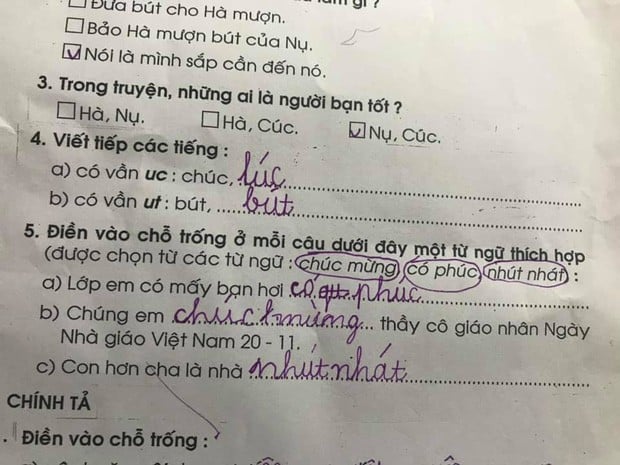Having a rich vocabulary is an important “weapon” to excel in Vietnamese. However, mastering Vietnamese vocabulary requires a long-term training process. For elementary school students, this is a challenging subject as their vocabulary is still in its infancy and very limited.
Therefore, in many situations, when the teacher assigns homework, the results of these “young learners” often surprise everyone. With their innocent and naive thoughts, many children have brought laughter to adults with their extremely “unique” answers.
For example, recently, a Vietnamese exercise by a student has quickly spread on social media, leaving parents with a mix of laughter and tears. The exercise required filling in the blanks to complete sentences with appropriate meanings. Among them were some familiar idioms that the children might have heard a lot in daily life.
However, it seems that the students were not very familiar with the content, so they “created” extremely humorous answers. This not only surprised the teacher but also amazed the parents and anyone who saw it, admiring the wit and rich imagination of these “future young learners.”
Specifically, the exercise provided three words: “chúc mừng” (congratulations), “có phúc” (blessed), and “nhút nhát” (shy). The most accurate answers would be: “Lớp em có mấy bạn hơi nhút nhát” (Our class has a few shy friends), “Chúng em chúc mừng thầy cô giáo nhân Ngày Nhà giáo Việt Nam 20-11” (We congratulate our teachers on Vietnamese Teacher’s Day, November 20th), and “Con hơn cha là nhà có phúc” (A child surpassing their parent brings honor to the family).
However, instead of providing the expected answers, the student used their “limited creativity” to come up with extremely funny responses: “Lớp em có mấy bạn hơi có phúc” (Our class has a few blessed friends) and “Con hơn cha là nhà nhút nhát” (A child surpassing their parent is a shy family). Although only one sentence is correct, and the other two are completely wrong, everyone had to laugh and nod in admiration of the student’s “awesome” thinking ability. Many people jokingly commented that this child also has their own perspective, as “If a father lets a child surpass him too easily, he is indeed shy.”

Many find the child’s perspective amusing, commenting that “If a father lets a child surpass him too easily, he is indeed shy.
In reality, this type of fill-in-the-blank exercise is not always easy for many students. It is especially challenging for those who have not fully developed their thinking skills and have a limited vocabulary. Without constant practice and improvement, they will face difficulties, leading to unsatisfactory academic performance and test results.
Therefore, to help children excel in this type of exercise, parents can apply the following training methods:
First, parents need to focus on developing children’s reading comprehension and vocabulary understanding. This is crucial because, to excel in fill-in-the-blank exercises, children need to clearly understand the meaning of each word and sentence. Parents can read books with their children and discuss the vocabulary used in the text, asking them to explain their reasons for choosing a particular word. This way, children will have a solid grasp of vocabulary and know how to apply them effectively in exercises.

Reading together and discussing vocabulary helps children understand and apply words effectively.
Second, parents need to guide children on spelling rules. Fill-in-the-blank exercises often require children to apply knowledge of combining vowels and consonants and writing correct syllables and words. Therefore, parents should explain these rules in detail and teach children how to recognize and distinguish them while doing the exercises.
Third, parents need to develop children’s reasoning and word-guessing skills. Many fill-in-the-blank exercises require children to use context and sentence logic to make appropriate choices. Parents can encourage children to think, analyze sentences, and make accurate selections. This not only improves their performance in these exercises but also enhances their critical thinking and problem-solving abilities.
Fourth, parents need to create a positive learning environment for their children. Providing diverse fill-in-the-blank exercises, creating a cheerful atmosphere, and encouraging their participation will help children gradually master the necessary knowledge and skills.
Finally, parents should regularly check, comment, and explain to their children. By pointing out mistakes, providing reasons, and guiding self-checking and correction, children will learn from their errors. This way, they will improve their performance in fill-in-the-blank exercises.

Regular feedback and explanations help children improve their performance in fill-in-the-blank exercises.
By combining these solutions, parents will significantly contribute to improving their children’s ability to complete fill-in-the-blank exercises.
Additionally, to help children expand their Vietnamese vocabulary, parents can apply the following measures:
– Read stories, books, and newspapers daily: Read with your children, encourage them to guess the meaning of new words, and explain how to use them in sentences.
– Interact regularly in Vietnamese: Converse, ask questions, and discuss various topics with your children in Vietnamese, encouraging proper pronunciation and appropriate word choice.
– Play vocabulary games: Organize games related to recognizing, categorizing, and searching for words to increase children’s curiosity and interest in the language.
– Teach vocabulary by themes: Group words according to familiar fields and activities to help children associate and remember words with similar themes.
– Encourage children to create sentences and paragraphs: Discuss their writing, help them correct mistakes, and find more appropriate expressions.






































